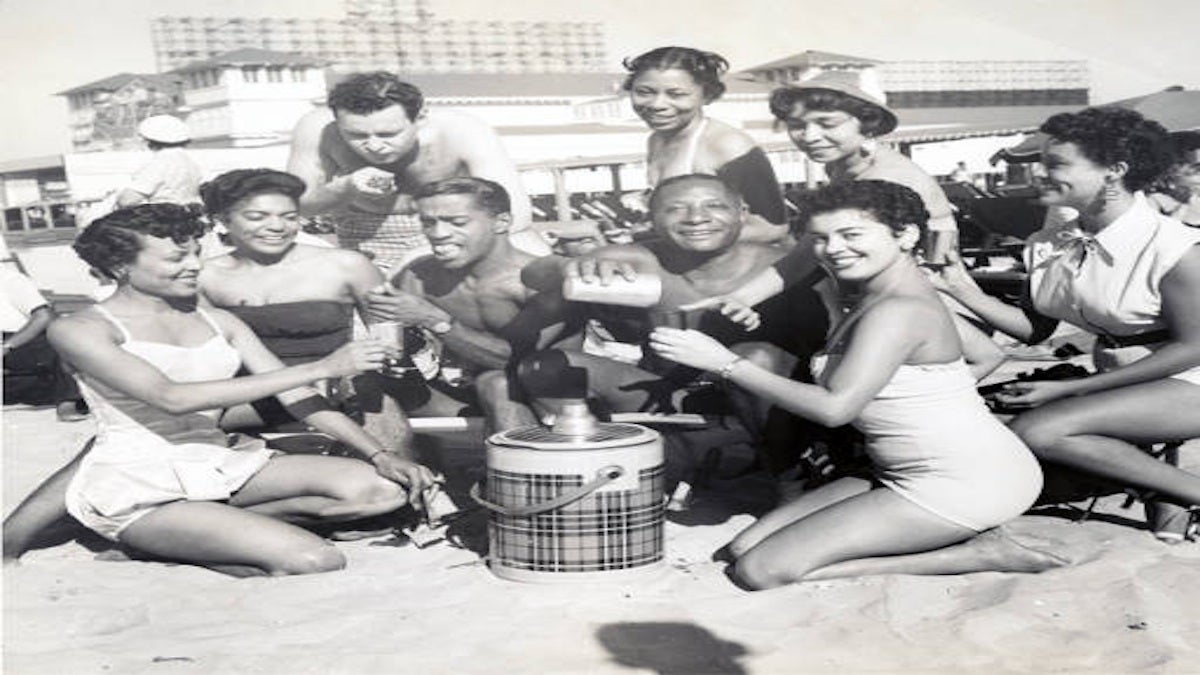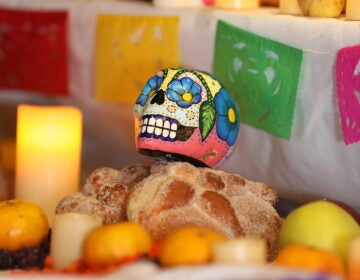African Americans remember glamour and separation in A.C.’s past
Listen
Sammy Davis, Jr. on Chicken Bone Beach in Atlantic City, New Jersey. (John W. Mosely/Courtesy of Temple University Libraries, Charles W. Blockson Collection)
These days, when Atlantic City residents get together, the talk usually turns to Sandy repairs. But on a recent Sunday morning, over a brunch a group of friends gathered to talk about the city’s glamorous and faded past.
Ralph Hunter, 75, is a local historian and founder of the African-American Heritage Museum. He’s lived in Atlantic City since the early 50s but still puts up with his friend’s good natured ribbing about him not being a “native” of Atlantic City.
Lifetime resident or not, Hunter is the keeper of some of the fading memorie’s from the vibrant cultural scene in Atlantic’s City’s northside neighborhood of African Americans.
In the 50’s and 60’s the neighborhood’s famous Club Harlem was at the center of northside nightlife, and a social hub for the African-American community. A place to see stars and be seen, a place drop the top and cruise.
Hunter remembers that the opening of the club each spring was a big event. “When Club Harlem opened, everybody within 500 miles knew that club was going to open. On Easter Sunday they had the parade, people would get dressed up in their finery and come to Atlantic City.
Club Harlem featured showgirls and the famous breakfast show which started at 3 a.m. and served booze, not breakfast. The club drew huge crowds by hosting stars like Lena Horne and Sammy Davis Jr.
Eighty-year-old Ken Hill was born and raised in Atlantic City and is a lifetime northsider. His house sits across the corner from Hunter’s and they look out for one another, go to the beach together and reminisce.
Hill was a popular regular at the northside night clubs and bars and part of the Glamour Row circle of good looking young partiers who hung out with the stars.
When he wasn’t at a club he was at the beach.
“It was our babysitter. My mom said, ‘Go to the beach, take your lunch and we’d cross the tracks down Missouri Ave. and be on the beach till 6 pm when the life guards left,”s remembered Hill.
On weekends in the 40’s, 50’s and 60’s African-Americans from New Jersey, New York and Philadelphia poured into Atlantic City’s northside beaches. Some came by bus, some by Cadillac all headed for Missouri Avenue beach – or as some called it Chicken Bone beach.
Muriel Greenwich who’s lived near the beach all of her 81 years explained that the the origin of that name came from picnickers who would bring lunches of fried chicken, which could be eaten cold and hold up to a day at the beach.
“They came in with their pots of collard greens and chicken and all sorts of Southern cuisine, and as a result, they needed some place to eat it, so they ate it on the beach,” said Greenwich.
Henrietta Wallace Shelton, who’s lived in AC six decades understands why most locals see the name as an insult and a slur, for a beach visited by everyone from Joe Louis to Martin Luther King Jr. A beach at the heart of the black community. She founded the Chicken Bone Beach Historical Society and Jazz Festival to reclaim the name and give it a positive association.
People went there at their best, to meet people. Deals were made on that beach. Friendship was made on that beach. Love affairs were made on that beach. It was a community, said Shelton.
Blacks went to Missouri Avenue beach partly because the other Atlantic City beaches did not welcome them. Hunter said there was a clear line you didn’t cross.
“Atlantic City’s northside consists of Connecticut Ave. to Arkansas Ave. and from Venice Park, you couldn’t go over the first bridge. From there back to Atlantic Ave. that was the ‘redline’ area where African Americans lived, worked, owned property, owned businesses, rented property, hotels, restaurants, bars,” explained Hunter.
Wallace S says the divisions were enforced without signs but the message was clear.
“Atlantic City was socially restricted. Even though in the south you have signs, it was unspoken signs, but that’s America,” Wallace said.
Every summer weekend, the old friends still go to the beach, but they’ve moved across town to the one on Caspian Avenue. Club Harlem is gone. Ken Hill, once the king of Glamour Row, is still considered the mayor of the relocated “Chicken Bone beach.”
“We love the beach,” said Hill. “It’s a part of our life.”
WHYY is your source for fact-based, in-depth journalism and information. As a nonprofit organization, we rely on financial support from readers like you. Please give today.




